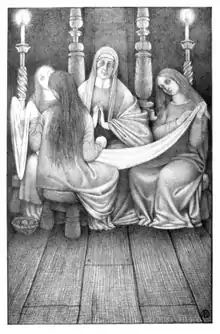Lord Thomas and Fair Annet
Lord Thomas and Fair Annet (Child 73, Roud 4) (also known as "Lord Thomas and Fair Eleanor") is an English folk ballad.[2]
| "Lord Thomas and Fair Annet" | |
|---|---|
 Vernon Hill's illustration of Annet being dressed for the wedding by her handmaids. From Richard Chope's 1912 collection Ballads Weird and Wonderful.[1] | |
| Song | |
| Genre | Folk song |
| Songwriter(s) | Unknown |
Synopsis
Lord Thomas (or Sweet Willie) is in love with Fair Annet, or Annie, or Elinor, but she has little property. He asks for advice. His father, mother, and brother (or some of them) advise that he should marry the nut-brown maid with a rich dowry. His mother promises to curse him if he marries Annet and bless him if he marries the nut-brown maid. His sister warns her that her dowry may be lost and then he will be stuck with nothing but a hideous bride. Nevertheless, he takes his mother's advice.
Fair Annet dresses as splendidly as she can and goes to the wedding. The nut-brown maid is so jealous that she stabs Annet to death. Lord Thomas stabs both the nut-brown maid and himself to death. A rose grows from Fair Annet's grave, a brier from Lord Thomas's, and they grow together.
Variations and related ballads
Regional and printed variations of the ballad are known by many titles, including "Fair Eleanor", "Lord Thomas and Fair Ellender", "Fair Ellen and the Brown Girl", "Lord Thomas's Wedding", "The Brown Bride", and others. Related English ballads which share stanza composition as well as narratives of heartbreak-induced death include Fair Margaret and Sweet William and Lord Lovel.[3][4]
Several Norse variants of this ballad exist, although the man does not reject the woman on advice of his friends in them.[5]
Commentary
The grave plants that grow together are a motif to express true love, also found in many variants of Barbara Allen and of Tristan and Iseult, and in the legend of Baucis and Philemon.
This ballad has no connection with "The Nut-Brown Maid", in which a nut-brown maid is the heroine.
Recordings
Many traditional recordings of the ballad have been made,
Jim Copper and Bob Copper had the Copper Family's traditional Sussex version recorded in 1952 and 1976,[6][7] Peter Kennedy recorded Charlie Wills of Dorset singing a version, and Caroline Hughes, also of Dorset, was recorded singing the ballad by Ewan MacColl / Peggy Seeger and by Peter Kennedy in the 1960s.[8][9] Collectors such as Peter Kennedy and Hamish Henderson recorded versions in Scotland in the 1950s and 60s.[10][11]
The song appears to have been extremely popular in the United States, where around 100 field recordings have been made,[12] including Alan Lomax's recording of Jean Ritchie in 1949,[13] a fragment of which can be heard on the Alan Lomax archive website.[14] Jean Ritchie later released a different version on her album "Best of Jean Ritchie".[15]
See also
References
- Chope, Richard (1912). Ballads Weird and Wonderful. New York: John Lane Company. pp. 60.
- Francis James Child, English and Scottish Popular Ballads, "Lord Thomas and Fair Annet"
- Francis James Child, The English and Scottish Popular Ballads, v 2, p 204, Dover Publications, New York 1965
- Coffin, Tristam P. (1950). The British Traditional Ballad in North America. Philadelphia, PA: The American Folklore Society. pp. 74–6.
- Francis James Child, The English and Scottish Popular Ballads, v 2, p 180, Dover Publications, New York 1965
- "Lord Thomas (Roud Folksong Index S213926)". The Vaughan Williams Memorial Library. Retrieved 2020-10-17.
- "The Bold Forester (Roud Folksong Index S169762)". The Vaughan Williams Memorial Library. Retrieved 2020-10-17.
- "Lord Thomas and Fair Ellender (Roud Folksong Index S339152)". The Vaughan Williams Memorial Library. Retrieved 2020-10-17.
- "Fair Ellen (Roud Folksong Index S370290)". The Vaughan Williams Memorial Library. Retrieved 2020-10-17.
- "Lord Thomas and Fair Ellen (Roud Folksong Index S214028)". The Vaughan Williams Memorial Library. Retrieved 2020-10-17.
- "Lord Thomas and Fair Ellen (Roud Folksong Index S332199)". The Vaughan Williams Memorial Library. Retrieved 2020-10-17.
- "VWML Search: RN4". Vaughan Williams Memorial Library.
- "Lord Thomas and Fair Ellender (Roud Folksong Index S341750)". The Vaughan Williams Memorial Library. Retrieved 2020-10-17.
- "Alan Lomax Archive". research.culturalequity.org. Retrieved 2020-10-17.
- "Lord Thomas and Fair Ellender (Roud Folksong Index S321152)". The Vaughan Williams Memorial Library. Retrieved 2020-10-17.
External links
| Wikisource has original text related to this article: |
- Lord Thomas and Fair Ellinor with some history